 Coming straight from the you-must-be-having-a-laugh folder, news reaches us that the Los Angeles Scout group is introducing a new merit award — the Respecting Copyright Patch. We kid you not.
Coming straight from the you-must-be-having-a-laugh folder, news reaches us that the Los Angeles Scout group is introducing a new merit award — the Respecting Copyright Patch. We kid you not.
The MPAA, the film industry trade body, has been instrumental in the development of the structure of the programme. To be awarded the badge, the young scouts will need to learn the basics of copyright law, five ways of identify copyright material and three ways that copyright material can be ‘stolen’.
I know, I know, it just sounds like one big fun-fest doesn”t it, but the fun doesn’t end there for those lucky kids. There is also a compulsory activity with a choice between either visiting a film studio to witness the number of people that are involved with the production of films (therefore helping them understand how many people would be affected if the whole thing closed down), or to create a public service announcement warning of the risks of ‘copyright theft.’
“We have a real opportunity to educate a new generation about how movies are made, why they are valuable, and hopefully change attitudes about intellectual property theft,” Dan Glickman, chairman of the Motion Picture Association of America told the press.
As veteran copyleft campaigner Cory Doctorow over at BoingBoing asked, how balanced will the tutoring of this patch be? Will the young and clearly impressionable scouts also be told about subjects such as Creative Commons?
There are 52,000 scouts in the LA area, many who have family members involved in some way with the creation of films, which is bound to help in its uptake of the patch. It is understood that the MPAA hope to take this ‘opportunity’ to a wider audience. Their plan? Expansion to the rest of California early next year, then to America as a whole.
The patch that they would earn, which is rather tacky to say the least, shows a (c) copyright symbol in the centre, with the left side displaying a CD and to the right, a film reel.
Just how many other industries are given the opportunity to spread their message through the American Scouts is unclear. To us it sound like a worrying trend.
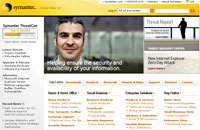 Hackers racked up attacks on home PC users and financial services companies in the first half of this year, according to the latest Symantec Internet Security Threat Report Trends.
Hackers racked up attacks on home PC users and financial services companies in the first half of this year, according to the latest Symantec Internet Security Threat Report Trends. The notoriously leisurely Microsoft averaged nine days per patch, but that snail-like response was still faster than Sun Microsystems.
The notoriously leisurely Microsoft averaged nine days per patch, but that snail-like response was still faster than Sun Microsystems.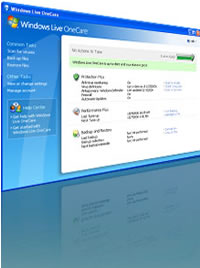 The study of sales figures after the first month of Microsoft’s Windows Live OneCare will not make pleasant reading for the current PC security software companies.
The study of sales figures after the first month of Microsoft’s Windows Live OneCare will not make pleasant reading for the current PC security software companies. NPD’s figures showed that the losses for the previously dominant security companies – Symantec cried the biggest tears with a 10.1% loss; McAfee said bye bye to 3.3% and Trend Micro 1.3%.
NPD’s figures showed that the losses for the previously dominant security companies – Symantec cried the biggest tears with a 10.1% loss; McAfee said bye bye to 3.3% and Trend Micro 1.3%. After refusing to entertain the idea for many years, the DVD Copy Control Association (DVD CCA), are ‘actively considering’ letting DVD to be burnt in-shops and by video download services.
After refusing to entertain the idea for many years, the DVD Copy Control Association (DVD CCA), are ‘actively considering’ letting DVD to be burnt in-shops and by video download services. DVD CCA are saying that once they get that up and working, they’ll work on a version that consumer can use at home. They’re talking about letting it record films, TV shows – clearly predicting the time when TV programs will not be freely recorded. Some online services like
DVD CCA are saying that once they get that up and working, they’ll work on a version that consumer can use at home. They’re talking about letting it record films, TV shows – clearly predicting the time when TV programs will not be freely recorded. Some online services like  Search engine giants Google have introduced a new feature which alerts punters about search results that could potentially lead them to dodgy sites with malicious code.
Search engine giants Google have introduced a new feature which alerts punters about search results that could potentially lead them to dodgy sites with malicious code.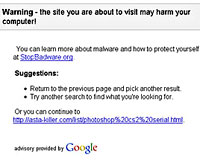 With search engine results routinely displaying links to sites stuffed full of spyware and adware, it is reckoned that US surfers arrive at on malicious sites about 285 million times per month – all from clicking on search results from the five major search engines.
With search engine results routinely displaying links to sites stuffed full of spyware and adware, it is reckoned that US surfers arrive at on malicious sites about 285 million times per month – all from clicking on search results from the five major search engines.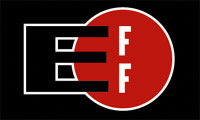 The BPI continued its policy of clamping down on illegal file sharing this week, when it contacted UK ISPs Cable and Wireless and Tiscali with requests to suspend 59 accounts.
The BPI continued its policy of clamping down on illegal file sharing this week, when it contacted UK ISPs Cable and Wireless and Tiscali with requests to suspend 59 accounts. In a statement on 12th July, the BPI stated “Early responses from both companies suggest that they will suspend accounts which have clearly been used for illegal filesharing” and indicated that it could supply detailed evidence on the other 16 Tiscali addresses. In an interview on More Four News Tiscali spokesman Richard Ayres said Tiscali’s message to the record industry is “Come to us, give us the details and we’ll absolutely work with you.” Which would seem to be in contradiction of Tiscali’s own letter, which also stated that “Tiscali does not intend to require its customers to enter into the undertakings proposed by you and, in any event, our initial view is that they are more restrictive than is reasonable or necessary.”
In a statement on 12th July, the BPI stated “Early responses from both companies suggest that they will suspend accounts which have clearly been used for illegal filesharing” and indicated that it could supply detailed evidence on the other 16 Tiscali addresses. In an interview on More Four News Tiscali spokesman Richard Ayres said Tiscali’s message to the record industry is “Come to us, give us the details and we’ll absolutely work with you.” Which would seem to be in contradiction of Tiscali’s own letter, which also stated that “Tiscali does not intend to require its customers to enter into the undertakings proposed by you and, in any event, our initial view is that they are more restrictive than is reasonable or necessary.” Coincidentally, the BPI action comes at the same time that the (US based)
Coincidentally, the BPI action comes at the same time that the (US based) 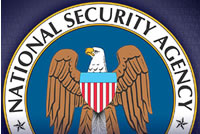 Think carefully the next time you edit your Flickr or Myspace profile.
Think carefully the next time you edit your Flickr or Myspace profile. 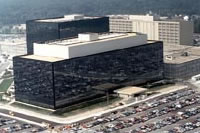 In September 2005 the European Commission adopted a proposal that would see telecommunications data held for one year and Internet data for six months and, last month, the European Court annulled the agreement which compelled airlines to submit private data on passengers flying to the US.
In September 2005 the European Commission adopted a proposal that would see telecommunications data held for one year and Internet data for six months and, last month, the European Court annulled the agreement which compelled airlines to submit private data on passengers flying to the US. Major UK consumer broadband providers NTL are teaming up with BitTorrent, the developers of the world’s most popular peer-to-peer (P2P) application.
Major UK consumer broadband providers NTL are teaming up with BitTorrent, the developers of the world’s most popular peer-to-peer (P2P) application.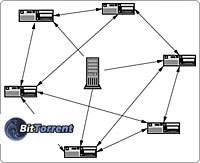 Naturally, rights holders and movie heavyweights weren’t too chuffed to see their content whizzing around the Internet for gratis, and quickly hired in squadrons of lawyers to apply pressure on BitTorrent.
Naturally, rights holders and movie heavyweights weren’t too chuffed to see their content whizzing around the Internet for gratis, and quickly hired in squadrons of lawyers to apply pressure on BitTorrent. P2P network, BitTorrent has signed an agreement with the Motion Picture Association of America to collaborate on stopping Internet piracy.
P2P network, BitTorrent has signed an agreement with the Motion Picture Association of America to collaborate on stopping Internet piracy.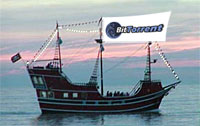 “BitTorrent Inc. discourages the use of its technology for distributing films without a license to do so. As such, we are pleased to work with the film industry to remove unauthorised content from BitTorrent.com’s search engine,” he added.
“BitTorrent Inc. discourages the use of its technology for distributing films without a license to do so. As such, we are pleased to work with the film industry to remove unauthorised content from BitTorrent.com’s search engine,” he added.